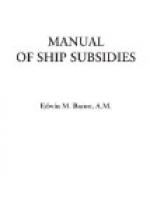The new mail subsidies provided for ten specified lines of “steamships of the United States” of sixteen, fourteen, thirteen, and twelve knots speed, to the greater countries of South America, to Central America, to Africa, and to the Orient, with a total maximum subsidy for the ten lines of $2,665,000 a year. In all contracts it was to be specified that the steamships must carry in their own crews a certain increasing proportion, up to one-fourth, of men enrolled as naval volunteers. The subventions to American general cargo carriers, or the “tramp” type of ships, and deep-sea fishing-vessels, steam or sail, were fixed at these rates: those engaged in the foreign trade for a full year, five dollars per gross ton; so engaged for nine months and less than a year, four dollars; for six months, two dollars. These subsidies were conditioned upon these requirements: the employment in the crews of a certain proportion of naval volunteers; one-sixth of the crews to be citizens of the United States or “men who have declared their intentions to become citizens;” ships to carry the mails when required free of charge; all ordinary repairs to be made in the United States; the ships to be in readiness for Government taking for naval service in time of need. The payments in this class were to be made on contracts for a year at a time, renewable from year to year; and no vessel was to receive them for a longer period than ten years. The retainers to officers and men of the merchant marine and deep-sea fishing-ships as inducements to enroll as naval volunteers, were fixed at rates ranging from a hundred dollars a year for the master or chief engineer of a large steamship to twenty-five dollars for a sailor or fireman, and fifteen dollars for a boy, these retainers being independent of their regular pay. The provisions relating to tonnage revenue increased the tonnage taxes on all vessels, American and foreign, entering American ports, with a rebate of eighty per cent of the tonnage duties allowed to American ships carrying American boys as apprentices and training them in seamanship or engineering for the merchant service and naval reserve.[HU]
The minority report, signed by three of the four Democratic members of the commission, although outlining measures of relief which, in the judgment of the signers, would “accomplish substantial and permanent good without injustice to any other American interest and without doing violence to any fundamental principle of right or of organic law,” proposed no bill. While the minority “saw objections to the entire bill” recommended by the majority, they were disposed to withhold any opposition except to the sections providing for direct subsidies. These they declared to be “so obnoxious to Democratic principles and to the economic sense of the country” that they were compelled to enter their “earnest protest against their enactment into law.” Instead of subsidies, the remedial legislation which they outlined included: a return to the discriminating-duty




